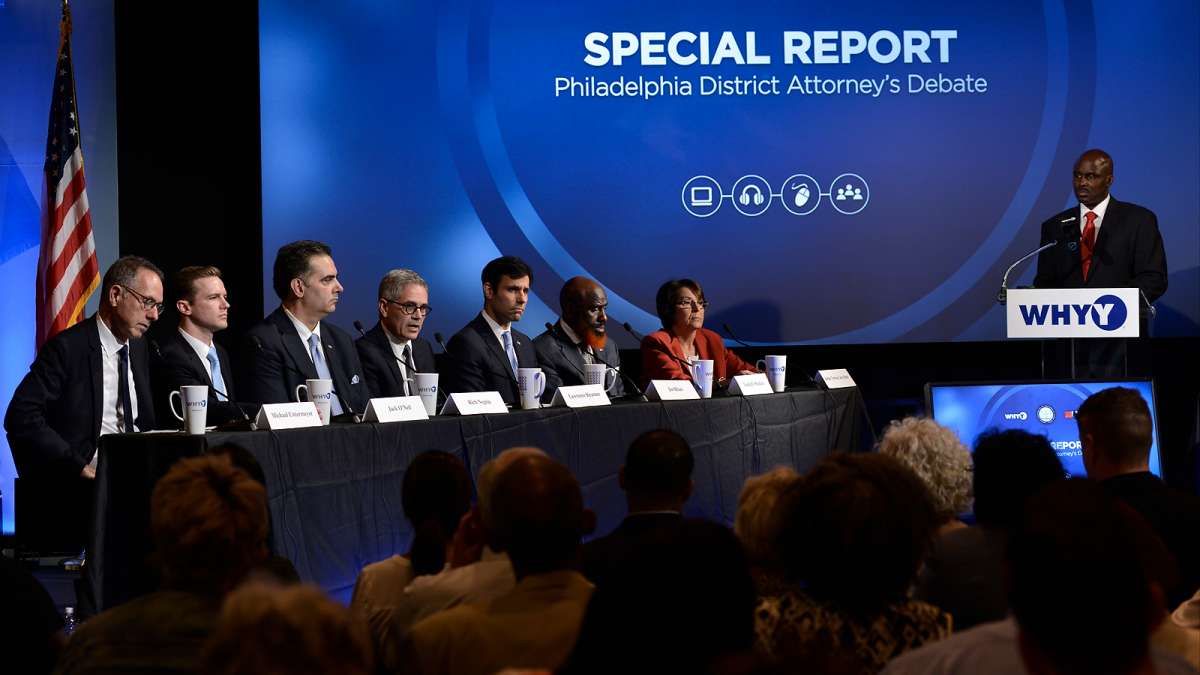Candidates, PACs disclose more under new Philly rules

Seven Democratic candidates participate in the NAACP/WHYY District Attorney Candidate Forum held at WHYY in the April 2017 file photo. (Bastiaan Slabbers for NewsWorks)
Candidates and independent spending groups invested more than $6 million this spring in the primaries for Philadelphia district attorney and city controller.
Thanks to some changes pushed by the Philadelphia Board of Ethics and enacted by City Council, the public had more information about that spending than ever before.
The state election code requires regular reports showing candidates’ contributions and spending. But, for some reason, it requires only a single report before municipal elections, 10 days before the election.
Shane Creamer, executive director of the ethics board, said that kept too much information hidden too long.
“The public wasn’t getting access to the bulk of the spending until the last minute,” Creamer said in an interview.
So, two years ago, after the mayoral primary in which super PACs made an appearance, the ethics board took a hard look at all the disclosure requirements.
The result were changes that did two things.
First, all candidates had to file an additional report, six weeks before the election.
Second, independent, non-candidate groups had to file reports six weeks, four weeks, two weeks, and one week before the election if they were spending money to influence the outcome.
Creamer said that made a difference this year, in which there was major outside spending to support Democratic candidates Larry Krasner and Jack O’Neill.
“Just one week before the election, we had three outside spenders file complete disclosure reports revealing approximately $700,000 in expenditures a week before the primary election,” Creamer said.
In all, independent groups spent nearly $2 million on the race, most of that from billionaire George Soros on behalf of Krasner, who won the Democratic primary.
How do candidates feel about having to file an extra report and show their cards earlier?
“Is it annoying to have an additional reporting cycle? Of course it is,” said attorney Adam Bonin, who represents candidates.
But Bonin said the extra transparency is a good thing for the process; in truth, candidates have their own reasons to like the extra reporting.
“If you’re a candidate, and you think your fundraising numbers are impressive, you want them out sooner rather than later,” Bonin said.
It addition, candidates like getting the skinny on what their rivals are up to.
“Yeah, I mean all of this information is useful,” Bonin said. “You want to see where various fundraisers and leaders have planted their flag.
“Besides seeing who contributed, candidates will want to see how others have done in getting contributions of $50 or less, because that is a marker of grass-roots support.”
The district attorney candidates managed to file all the required reports, though Teresa Carr Deni was late with two of them.
WHYY is your source for fact-based, in-depth journalism and information. As a nonprofit organization, we rely on financial support from readers like you. Please give today.


